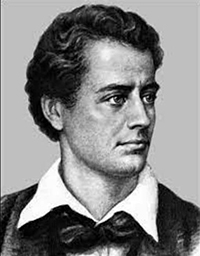
George Gordon Byron was born on 22 January 1788 in London. A childhood spent in a crumbling castle inherited from an uncle, heavy clashes with a powerful mother, a physical handicap (a small congenital limp that caused ridicule) All this contributed to the early awakening of a sense of loneliness and alien to the world around us. This feeling became one of Byron’s dominant texts.
The boy was educated by a home teacher and then sent to a private school in Dalwich. In 1801, Byron enrolled at the closed aristocratic school in Harrow, near London, and in 1805 at Trinity College, Cambridge University. He studied rather poorly, but read a lot; in school he was known for his comrades' chivalry and for always protecting the younger ones.
Back in Cambridge, Byron was very secular, so he always needed money and was in debt. In 1809, fleeing from moneylenders and in search of new impressions, the poet went with his friend D.K. Hobhouse on a long journey.
They visited Portugal, Spain, Albania, Greece and Constantinople. Byron returned to England only two years later and brought with him the manuscript of the poem « Childe Harold's Pilgrimage». She spoke of a sad traveller (certainly reminiscent of the author) destined to experience the frustration and frustration of young people.
The poem was published and immediately celebrated the poet’s name not only in England, but throughout Europe. The success of «Childe Harold» gave Byron a warm welcome in the Whig circles - now he appears in the highest light, has business and love relations there. He soon marries a girl from the upper world for a short period of time. After a non-working relationship, Byron again travels through Europe.
In Europe he writes the third and fourth songs «Childe Harold», poetry «Shilion Uznik» and «Beppo», drama «Manfred», new songs of previously written poem «Don juan», evil satire «The Vision of judgment», drama in poems «Cain», other works.
He participates in the Italian liberation movement and the carbonic conspiracy; after the defeat of the revolt he goes to Pisa, then to the villa near Livorno, and then to Genoa, where he completes the work on «Don Juan». Byron turned the legendary seducer into a «simpleton» and the hero of a lyric satirical novel about pluto.
Byron died of fever on 19 April 1824 in Greece. The coffin with his body was sent to his home country and buried next to his former Newsted Manor.
Laura Asylmuratkyzy, librarian of the International Book Department

